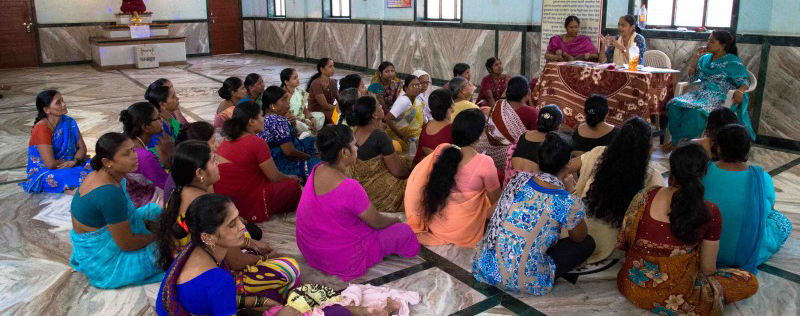How Badrunisa is working for access to basic amenities in her community

Badrunisa was born in Uttar Pradesh, and moved to Mumbai after she married, at age 14. Her husband is 10 years older than her, and they have 11 children: 7 girls and 4 boys. Five of the girls are married now. Badrunisa’s husband, parents-in-law and children have always been very supportive of her. Her husband has encouraged her to do whatever work she chooses, as long as it’s good and honest. She was a housewife before she was associated with CORO (and not actively involved in social work), but had some knowledge of the issues that existed in the community.
Her first introduction to CORO came about 10 years ago through the Women’s Group Federation (also known as the Mahila Mandal Federation). She received intensive training from CORO about the right way to speak to the community and encourage them to aim for positive changes in their neighbourhoods. She says that the learning process she started then is still ongoing.
Badrunisa ran a Case Registration Centre (CRC) for five years with people from the community. Through the CRC, she helped women report domestic violence and told them about existing laws that would help them. For example, when a case gets registered at the CRC, and can’t be resolved within the community, Badrunisa helps the abused woman to lodge a complaint with the police and open a court case. Her work has spanned 355 women’s groups, comprising 9,700 member women.
Badrunisa says she enrolled for the Quest Fellowship after five years of running the community CRC because the women in the Federation felt she could do even more – and they urged her to broaden the impact of her work. She had the opportunity to expand her horizons and travel to different places for training programmes.
When she started her Fellowship, she conducted a survey, across 616 households, and found that the major issues were water scarcity, domestic violence, child labour, substance abuse and sexual harassment. Groups of men would stand around toilets and the marketplace and harass women. Women and girls would be picked up and raped at night, when it was completely dark because there was no electricity in the houses.
Now, after her interventions, over 1,000 households have electricity meters and a functioning electricity connection. There aren’t just awareness groups for women and girls – there are also male groups in the community now, and these groups come together to work on social issues. They are also a good medium for creating gender sensitisation, and this has led to a reduced rate of rape in the community. In other words, men are more respectful towards women.
Because of a petition filed with the Bombay [Mumbai] Municipal Council (BMC), the community roads are now paved, and gutters are no longer open and overflowing (they are regularly cleaned). There is a waste dumping ground near the community where several women and children from the community work, and flammable and non-combustible material is now being divided up before waste is burnt to prevent fires or excessive smoke. A motion has also been passed to build a new toilet in the community, but this is currently on hold because the community has raised objections (because of safety issues and misconceptions about waste management).
Badrunisa says that her work is met with much less resistance now – she doesn’t receive threats from the community any more, and people respect her. In case problems do occur, CORO is there to support her. Initially, it was the women in the community who came forward to sanction her work, but the men are also supportive now – as are the police. Once they realised that the community was knowledgeable about existing laws and could no longer be brushed off, they started paying attention to complaints lodged by the community. Badrunisa is also a part of the Women Vigilance Committee, and is called upon to help when a case is registered at the police station. All cases are now logged and resolved conclusively – the community doesn’t even have to bribe the police, who in turn don’t have to be pressurised into responding.
One issue that is still highly prevalent is substance abuse and addiction. Badrunisa feels strongly that addiction is a problem that won’t just go away. She says addicts stay clean for some time, and then lapse back into old habits. The only way for them to get clean is to find steady jobs that keep them busy. She talks about how the young male addicts are extremely self-destructive if they don’t get their fix. The parents of these boys are opposed to the community lodging police complaints about their children – they believe that their children’s behaviour will deteriorate further if they are given jail sentences. They feel that it would be better if they talked to their children themselves, and tried to prevent them sinking further into addiction and crime.
Badrunisa says that the knowledge she’s gained via the Fellowship is immeasurable. She has earned the respect of the community because she is now able to handle issues with diplomacy and tact.. She feels that this has been a fundamental change of thought-process for her. She is also unafraid to work outside her community or city now.
Badrunisa talks about the changes she sees in her community. Women are treated with more respect and girls are better educated – they are now able to study until age 17-18. Young boys in the community also want to form groups to address social issues. She has already established five women’s groups and has just started six more. She feels that her greatest payback is when a case is solved and justice is achieved. She wants to keep working to generate awareness on the issue of gender equality, to eradicate violence against women.
